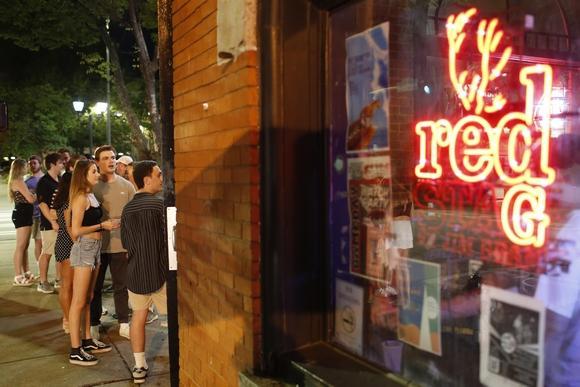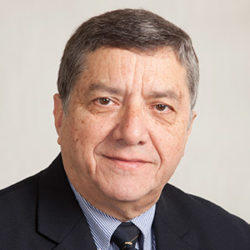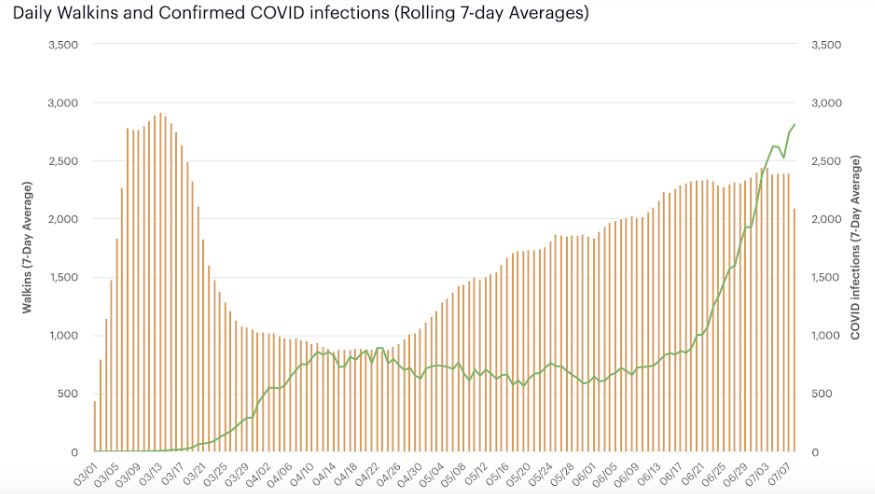
Section Branding
Header Content
Bars And COVID-19: Can Safety Guidelines Work?
Primary Content

A required 10 p.m. cutoff for serving alcohol in bars has put Georgia’s best-known college town in the cross-hairs of a COVID-19 debate.
Should states or local governments shut down bars to curb the coronavirus surge? Short of that, should they limit bars’ hours?
The Athens-Clarke County Commission recently passed an ordinance requiring that bars have their last call for alcohol at 10 p.m. Previously, the rule in the area was generally a 2 a.m. last call.
Bar owners promptly filed a lawsuit over the new rule, and a judge granted a temporary restraining order that stops enforcement of the 10 p.m. restriction.
That legal dispute in the home city of the University of Georgia has yet to play out. But public health experts say bars, whatever hours they keep, are ideal breeding grounds for the virus.
Colin Smith, a health management and policy expert at Georgia State University in Atlanta, notes that transmission occurs frequently in enclosed spaces where there is close person-to-person contact and inadequate air flow.
“In bars, people will be close together and less likely to engage in proper behavior,’’ says Smith, past president of the Georgia Public Health Association. “Alcohol lowers people’s inhibitions.’’
This story comes to GPB through a reporting partnership with Georgia Health News.
Nationally, public health officials have identified bars as the centers of major outbreaks in Louisiana, Florida, Wyoming, Michigan and Idaho.
“Bars: really not good, really not good,” Dr. Anthony Fauci, a leading infectious disease expert, told a Senate committee hearing on COVID-19 in late June. “Congregation at a bar, inside, is bad news.”
Because of these concerns, shutdowns of bars have occurred in several states, including North Carolina, while in other states, limits on serving times have been adopted. Some localities have struggled to find a workable policy, with orders on bars tightened, then loosened, and in places such as Texas, Florida and California, tightened once again.
In Georgia, Gov. Brian Kemp shut bars and nightclubs in March. On June 1, he allowed them to reopen with capacity limits and additional guidelines. In order to reopen, they had to take 39 measures, including screening workers for illness, limiting occupancy and requiring regular sanitation. His rules permitted gatherings of as many as 25 people.
On June 16, the rules were relaxed, with gatherings of 50 people allowed if they could stay six feet apart. Bars were allowed to admit 50 people or 35 percent of the facility’s total listed capacity, whichever number was greater.
Kemp said at the time that his reopening moves were resuscitating the state’s economy after it was stalled by the pandemic.
As restrictions have eased over the past two months, however, there has been an increase in state investigations of COVID-19 cases linked to bars and restaurants, Georgia Public Health figures show.

“The challenge is that many bars are small in terms of space,’’ which makes social distancing difficult, says Jose Cordero, a professor of epidemiology at the University of Georgia’s College of Public Health. “When you sip a drink, you can’t have a mask on.’’
“How do we protect people from getting COVID — that’s the bottom line,’’ Cordero adds. In Athens bars, he says, “too many people will have close proximity’’ to others.
UGA health officials say that as of Wednesday, a total of 443 UGA faculty, staff, and students have tested positive for COVID-19. That’s not a current snapshot of cases, but is a cumulative total since March.
A recent letter to Kemp signed by more than 2,100 Georgia health care workers urged him to take several steps to curb the pandemic, including recommending that he close bars and nightclubs, and prohibit indoor dining as well as gatherings of more than 10 people, including at houses of worship.
“While we understand your reluctance to shut down the state due to economic repercussions, the repercussions of not controlling the virus will take a heavy toll on our economy, as well as our health,’’ the letter said.
More people coming in
Foot traffic in Georgia bars and restaurants has increased significantly in recent weeks, according to the data firm Zenreach.
The company’s data experts use Wi-Fi hot spots to track in-store foot traffic. Zenreach, analyzing national data on bars and nightclubs from May 1 to July 15, saw a 68.8 percent increase in foot traffic, while there has been a 122.3 percent increase in virus cases across the country.

Since May 1, COVID-19 cases in Georgia have risen over 400 percent, compared to a national average of a bit over 130 percent in that same time period, the company said.
Since states lockdowns were eased, Zenreach says, the data show a slow but steady increase in people returning to nightlife activities, ‘and across the country we are now at almost half of last year’s numbers (45 percent). The data shows a pretty strong correlation between this increase in social activity and the spread of the virus.’’
States such as Georgia, Arizona, and Florida that had shorter lockdown periods have seen the highest growth in retail foot traffic — and the highest growth in the spread of new virus cases, Zenreach says. Each state saw its bar and nightclub traffic return to over 60 percent of last year’s numbers — while the Georgia figure was more than 70 percent. ‘‘That means a three-times increase in social activity in those states since mid-April,’’ Zenreach says.
States that had longer lockdown periods — such as New York, New Jersey, and Massachusetts — had nightlife traffic not exceeding 45 percent through the end of June, and the number of new COVID cases has dropped or plateaued since then.
Athens worries about student drinkers
In Athens, Mayor Kelly Girtz, defending the 10 p.m. bar ordinance, points out that the commission has altered last-call rules in the past, before COVID-19 was an issue.
The ordinance comes as “a response to a growing understanding of COVID-19,’’ he said.

And the tighter rule preceded the arrival of tens of thousands of University of Georgia students coming to Athens for the fall semester.
“10 p.m. in a bar can be very different from 1:30 a.m. in a bar,’’ Girtz says. “The effect of alcohol is people get closer and louder.’’
“I do know of specific employees of bars who have [tested] positive’’ for the virus, he adds.
The lawsuit by bar owners contends that the last-call ordinance violates Gov. Kemp’s executive order, which prohibits local governments from adopting COVID-19 measures that are stricter or looser than his statewide rules. The City of Atlanta’s order requiring masks is a high-profile test case of that issue, as Kemp encourages mask wearing but says no municipality should require it.
Athens is among several Georgia cities that have mask requirements. Girtz says people are being asked to comply with the rule, and that “we bought tens of thousands of masks for the community.’’ No tickets have been written against violators, he says.
n attorney for the bar owners, Mo Wiltshire, says the real aim of the Athens-Clarke Commission is simply to close bars during the pandemic, and “they’re trying to do an end run around the rules’’ by imposing other restrictions.
“They thought they could get away with moving up the last call,’’ Wiltshire adds. “This is what the governor has authority to regulate. You can’t regulate in the area of COVID-19.’’
He said the coalition of bar and restaurant owners “is very willing to meet the commission in the middle.’’
Girtz, the mayor, recognizes the overall difficulty facing local governments that try to take the correct steps to reduce transmission of the disease.
“There are no perfect answers,’’ he says. “It’s a really challenging time. We have to make good decisions with the information we have. I really feel for the business owners.’’
This story comes to GPB through a reporting partnership with Georgia Health News.

